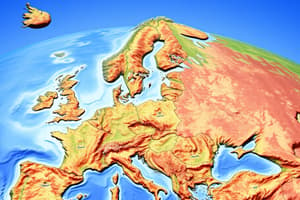Podcast
Questions and Answers
What is the primary focus of topography in geography?
What is the primary focus of topography in geography?
- The cultural practices of a community
- The arrangement of physical features of an area (correct)
- The population demographics of a region
- The diversity of species in an ecosystem
Who is known for calculating the Earth's circumference?
Who is known for calculating the Earth's circumference?
- Carl Ritter
- Alexander von Humboldt
- Eratosthenes (correct)
- Yi-Fu Tuan
Which profession primarily involves creating maps?
Which profession primarily involves creating maps?
- Travel Writer/Journalist
- Environmental Consultant
- Cartographer (correct)
- Urban Planner
What does biodiversity refer to in geography?
What does biodiversity refer to in geography?
What is physical geography focused on?
What is physical geography focused on?
Which of the following best describes cultural landscape?
Which of the following best describes cultural landscape?
Which of the following best defines absolute location?
Which of the following best defines absolute location?
What is included in human geography?
What is included in human geography?
Which tool is primarily used for analyzing spatial data?
Which tool is primarily used for analyzing spatial data?
What does the concept of 'movement' in geography refer to?
What does the concept of 'movement' in geography refer to?
What is a key issue in geography related to the sustainability of resources?
What is a key issue in geography related to the sustainability of resources?
Which type of region is defined by common cultural features?
Which type of region is defined by common cultural features?
What is one of the main applications of remote sensing in geography?
What is one of the main applications of remote sensing in geography?
Flashcards are hidden until you start studying
Study Notes
Definition of Geography
- Study of the Earth’s landscapes, environments, and the relationships between people and their environments.
- Includes both physical and human geography.
Branches of Geography
-
Physical Geography
- Examines natural features and processes (landforms, climates, ecosystems).
- Key topics include geology, meteorology, and hydrology.
-
Human Geography
- Focuses on human activities and their impact on the environment.
- Key areas include urban development, cultural landscapes, and economic systems.
-
Geographical Techniques
- Use of tools like Geographic Information Systems (GIS), remote sensing, and cartography.
- Methods for data collection and spatial analysis.
Major Concepts in Geography
-
Location
- Absolute Location: Exact coordinates (latitude and longitude).
- Relative Location: Position in relation to other places.
-
Place
- Characteristics that make a location unique (physical and human traits).
-
Region
- Areas defined by common features (cultural, physical, economic).
- Types of regions: formal, functional, and vernacular.
-
Movement
- Mobility of people, goods, and ideas.
- Includes globalization and migration patterns.
-
Human-Environment Interaction
- How humans adapt to and modify their environment.
- Concepts include sustainability and environmental impact.
Tools Used in Geography
- Maps: Visual representation of areas; types include topographic, thematic, and political maps.
- GIS: Technology for storing, analyzing, and visualizing spatial data.
- Remote Sensing: Collecting data from satellites or aircraft to monitor and analyze the Earth's surface.
Key Issues in Geography
- Climate Change: Effects on weather patterns and ecosystems.
- Urbanization: Growth of cities and its impact on lifestyles and environments.
- Globalization: Interconnectedness of economies, cultures, and populations.
- Resource Management: Sustainable use of natural resources.
Important Geographical Terms
- Topography: The arrangement of natural and artificial physical features of an area.
- Biodiversity: Variety of life in a particular habitat or ecosystem.
- Cultural Landscape: The visible imprint of human activity on the landscape.
Famous Geographers
- Eratosthenes: Known for calculating the Earth's circumference.
- Carl Ritter: Pioneer of modern human geography.
- Yi-Fu Tuan: Contributed to the understanding of space and place.
Careers in Geography
- Urban Planner
- Cartographer
- Environmental Consultant
- GIS Specialist
- Travel Writer/Journalist
Conclusion
Geography is an interdisciplinary field that combines natural and social sciences to understand the complex relationships between people and their environments, crucial for addressing global challenges.
Definition of Geography
- Geography explores Earth’s landscapes, environments, and how humans interact with them.
- Encompasses both physical geography (natural processes) and human geography (human activities).
Branches of Geography
-
Physical Geography
- Studies natural features such as landforms, climates, and ecosystems.
- Key subfields include geology (study of Earth), meteorology (study of weather), and hydrology (study of water).
-
Human Geography
- Investigates human activities and their environmental impacts.
- Key focuses include urban development (city planning), cultural landscapes (human influences on landscapes), and economic systems (market dynamics).
-
Geographical Techniques
- Incorporates technologies such as Geographic Information Systems (GIS), remote sensing, and cartography for data representation.
- Essential for spatial data analysis and collection.
Major Concepts in Geography
-
Location
- Absolute Location: Specific coordinates (latitude and longitude).
- Relative Location: Position in relation to other geographic entities.
-
Place
- Defined by unique physical and human characteristics that differentiate it from other locations.
-
Region
- Areas defined by shared features, which can be cultural, physical, or economic.
- Types of regions include formal (official boundaries), functional (served by certain functions), and vernacular (perceptions of inhabitants).
-
Movement
- Examines the mobility of people, goods, and ideas.
- Relevant concepts include globalization (worldwide exchanges) and migration patterns.
-
Human-Environment Interaction
- Studies humans’ adaptations to and modifications of their environment.
- Includes concepts such as sustainability (keeping ecosystems viable) and environmental impact (effects of human actions).
Tools Used in Geography
-
Maps
- Serve as visual representations of regions; types include topographic (landform features), thematic (specific topics), and political (boundaries and governance).
-
GIS
- A system for storing, analyzing, and visualizing spatial data, crucial for modern geographical studies.
-
Remote Sensing
- Involves collecting data from satellites or aircraft for monitoring and analyzing various features of the Earth’s surface.
Key Issues in Geography
-
Climate Change
- Affects weather patterns and disrupts ecosystems globally.
-
Urbanization
- The rise of cities influences lifestyles, economies, and environmental conditions.
-
Globalization
- Highlights the interconnectedness of global economies, cultures, and populations.
-
Resource Management
- Focuses on the sustainable use of natural resources to meet human needs without depleting them.
Important Geographical Terms
-
Topography
- Refers to the arrangement and features of landforms and artificial structures in an area.
-
Biodiversity
- The variety of life found within a specific habitat or ecosystem, vital for ecological health.
-
Cultural Landscape
- Represents the visible imprint of human activity and cultural practices on the landscape.
Famous Geographers
-
Eratosthenes
- Renowned for calculating the Earth’s circumference, laying groundwork for geographical science.
-
Carl Ritter
- Considered a pioneer in modern human geography and emphasized the relationship between people and their environments.
-
Yi-Fu Tuan
- Contributed significantly to the understanding of concepts of space and place within geographical studies.
Careers in Geography
- Urban Planner: Works on the development and management of urban areas.
- Cartographer: Designs and creates maps for various uses.
- Environmental Consultant: Advises on environmental best practices and sustainability.
- GIS Specialist: Focuses on spatial data analysis using GIS technology.
- Travel Writer/Journalist: Reports on geographical and cultural aspects of different regions.
Conclusion
- Geography is an interdisciplinary field merging natural and social sciences, essential for comprehending and addressing global challenges in various contexts.
Studying That Suits You
Use AI to generate personalized quizzes and flashcards to suit your learning preferences.




